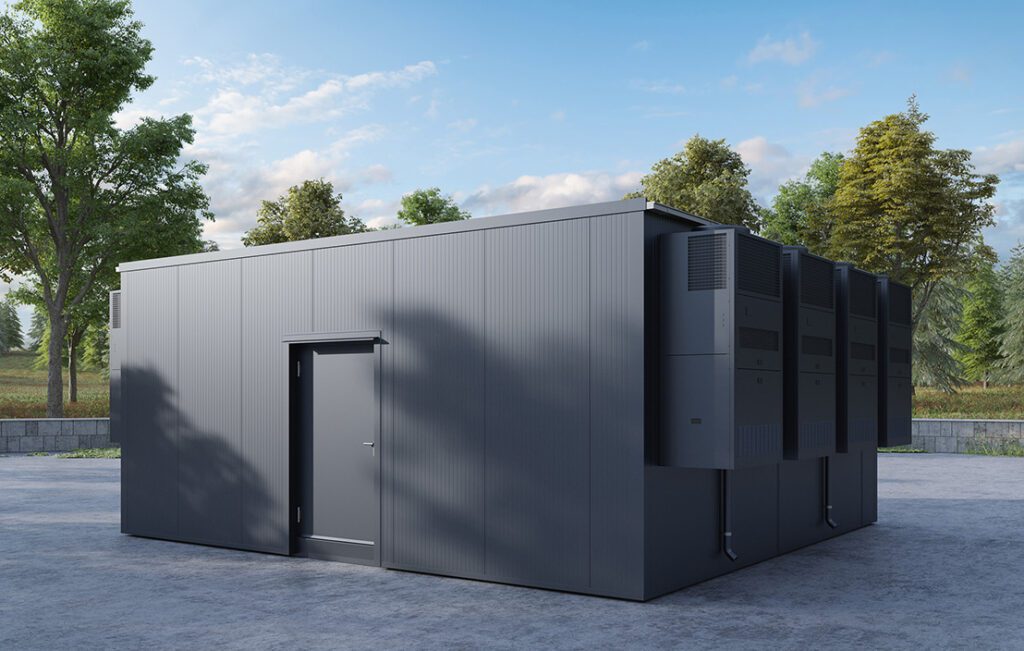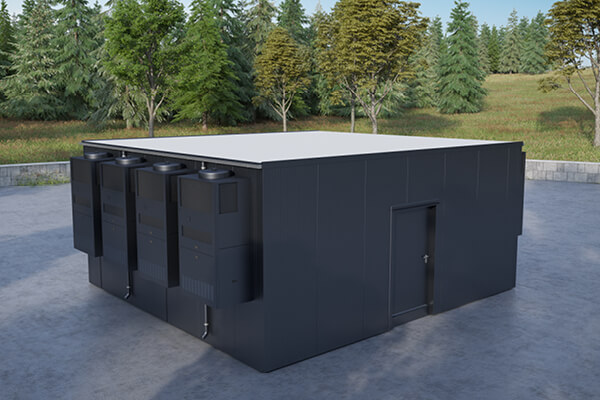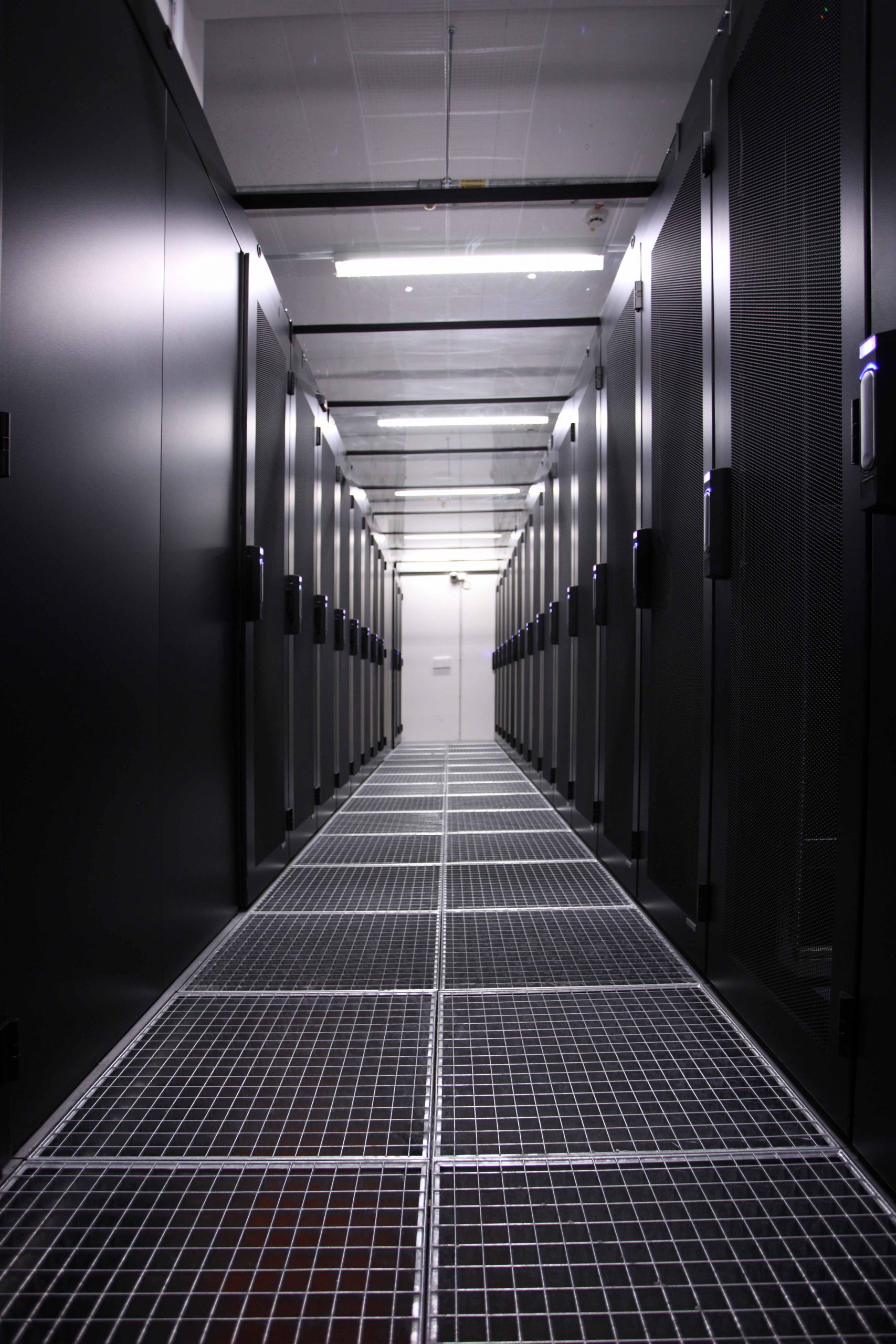Did you know that nearly all providers of ‘modular data centres’ offer practically no fireproofing for their IT data centres, even though this is recommended?

Data centres are essential for businesses, organisations and public authorities, for storing their data and managing their systems.
Fire protection in data centres is vital to guarantee the security of data and technologies.
But the serious risk to data centres does not come from internal fires, rather from the effects of fires outside of the data centre that must be prevented in all cases from spreading to the IT inside. This is not only because of the severe damage to technology and data that a fire can cause, but also because of the associated downtime and loss of business.

Modular construction system: Leading the way in fire protection as the only provider with protection against fires on the outside
Compared with conventionally constructed buildings, such as those made of concrete, but especially compared with container data centres, only Cadolto Datacenter’s modular construction techniques can provide fire protection from the outside in. All other construction methods look at fire protection the wrong way round, they protect the environment outside the data centre from fires within. However, such situations barely ever arise, and even when they do the results do not have the same potential for existential damage as when the IT is affected in the data centre. Thanks to the consistent use of fire-retardant building materials, fire protection bulkheads and ventilation systems, Cadolto Datacenter’s modular data centres can offer significantly better protection than conventionally built data centres. Even F120 fire protection walls do not pose a serious challenge to modular design; with the focus from the outside in, of course.
The situation is even clearer for container data centres, where the structural fire protection consists of planking simple sea-freight containers with fire protection panels on the inside, especially on the walls and ceilings. This approach is entirely misconceived and offers absolutely no protection for the IT within the container.
The planning and implementation of fire protection measures in container data centres is consequently nothing more than window dressing. It is always inferior to the Cadolto Datacenter modular construction technique with regard to the direction of fire protection, but also with regard to the maximum fire protection that can be achieved in containers; it also falls short of the requirements of EN 50600 and other certifications.

Choosing the right fire protection technology
Effective fire protection strategies for data centers: the choice between sprinkler, gas and aerosol extinguishing systems
A reliable fire alarm system is essential for the early detection of fires in data centres and sounding the alarm. The choice of extinguishing system depends on the type of data centre, the equipment it houses and operator preferences.
Sprinkler systems are effective but often cause water damage to technology and data. Gas extinguishing systems and aerosol-based solutions are non-conductive and can put out the fire quickly without damaging IT equipment.
Optimal fire protection for modular data centers: challenges in the approval process
Fire breaks and bulkheads are important in limiting the spread of fire and smoke within the data centre. They must run both vertically and horizontally and be composed of fireproof materials. Only approved materials should be installed, making the installation in the modular construction system’s walls more complex than in conventional buildings.
This is solely because there are more approved parts and systems available for use in conventional construction than in modular construction. Manufacturers such as Cadolto Datacenter hold certifications obtained by conducting their own fire testing. This acts as a market-entry barrier to competitors.
Modular data centres from Cadolto Datacenter can guarantee the best possible fire protection thanks to the precisely tailored combination of construction methods, fire detection, extinguishing systems and bulkheads.
Protected inside and out: Modern fire protection for data center modules from CDC
Frequently overlooked, but still very important: fire protection in data centres is required not only on the inside, for the IT infrastructure, but also for external fires. This is the only way of preventing fires from penetrating into the data centre.
CDC’s data centre modules are therefore fitted with state-of-the-art external fire protection technology to stop fires outside the module from taking hold within.
Integrated fire protection: modern systems from Cadolto Datacenter for early detection
Fire protection at the data centre against the outside is also crucial for the early detection of such fires outside the modules. Modern systems such as those installed in the Cadolto Datacenter modules can detect external fire hazards and autonomously take appropriate measures to combat the fire.
This means that Cadolto Datacenter systems attached to the outside of the module can help improve fire protection inside the data centre. Fires are detected at an earlier stage and extinguished more quickly so that fire damage is minimised and the IT equipment is not affected.
Prepared for everything: maintenance and training
Regular inspection and servicing of fire protection equipment is just as important as staff training for fire fighting and evacuation. Employees should receive regular training on fire protection measures and procedures to follow in case of a fire so that they can respond safely and quickly.
Fire protection in data centres is vital to guarantee the security of data and technologies. When planning and implementing fire protection measures, CDC works with the customer to develop the optimum fire protection systems in accordance with the customer’s business security and availability requirements.

Conclusion: Cadolto Datacenter modular construction system guarantees first-class fire protection
Cadolto Datacenter prefabricated modules are manufactured in the factory under controlled conditions, guaranteeing high quality and consistency. The precise design and production processes help minimise the risk of faults and defects when erecting the data centre. The same applies to costs. This ensures compliance with fire protection rules and regulations.
The modular building techniques allow the data centre to be designed and constructed in accordance with the customer’s specific requirements. This fast and efficient construction method means that data centres can be put into operation at short notice and that customers can therefore respond more quickly to business needs. Standardisation is key to the process.
Overall, the Cadolto Datacenter modular construction system offers numerous benefits, in particular with regard to flexibility, efficiency and fire protection.

